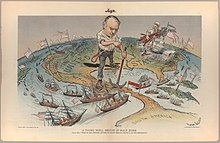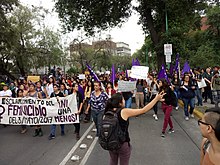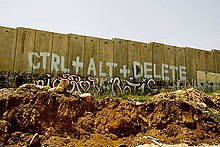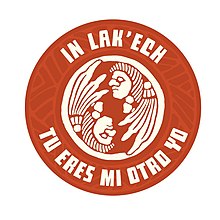| This article may be too technical for most readers to understand. Please help improve it to make it understandable to non-experts, without removing the technical details. (December 2023) (Learn how and when to remove this message) |

Decoloniality (Spanish: decolonialidad) is a school of thought that aims to delink from Eurocentric knowledge hierarchies and ways of being in the world in order to enable other forms of existence on Earth. It critiques the perceived universality of Western knowledge and the superiority of Western culture, including the systems and institutions that reinforce these perceptions. Decolonial perspectives understand colonialism as the basis for the everyday function of capitalist modernity and imperialism.
Decoloniality emerged as part of a South America movement examining the role of the European colonization of the Americas in establishing Eurocentric modernity/coloniality according to Aníbal Quijano, who defined the term and reach.
Decolonial theory and practice have recently been subject to increasing critique. For example, Olúfẹ́mi Táíwò argued that it is analytically unsound, that "coloniality" is often conflated with "modernity", and that "decolonisation" becomes an impossible project of total emancipation. Jonatan Kurzwelly and Malin Wilckens used the example of decolonisation of academic collections of human remains, which were collected during colonial times to support racist theories and give legitimacy to colonial oppression, and showed how both contemporary scholarly methods and political practice perpetuate reified and essentialist notions of identities.
Foundational principles
Coloniality of knowledge
This section is an excerpt from Coloniality of knowledge.
Coloniality of power
This section is an excerpt from Coloniality of power. The coloniality of power is a concept interrelating the practices and legacies of European colonialism in social orders and forms of knowledge, advanced in postcolonial studies, decoloniality, and Latin American subaltern studies, most prominently by Anibal Quijano. It identifies and describes the living legacy of colonialism in contemporary societies in the form of social discrimination that outlived formal colonialism and became integrated in succeeding social orders. The concept identifies the racial, political and social hierarchical orders imposed by European colonialism in Latin America that prescribed value to certain peoples/societies while disenfranchising others.Colonialism as the root

The decolonial movement includes diverse forms of critical theory, articulated by pluriversal forms of liberatory thinking that arise out of distinct situations. In its academic forms, it analyzes class distinctions, ethnic studies, gender studies, and area studies. It has been described as consisting of analytic (in the sense of semiotics) and practical "options confronting and delinking from the colonial matrix of power" or from a "matrix of modernity" rooted in colonialism.
It considers colonialism "the underlying logic of the foundation and unfolding of Western civilization from the Renaissance to today," although this foundational interconnectedness is often downplayed. This logic is commonly referred to as the colonial matrix of power or coloniality of power. Some have built upon decolonial theory by proposing Critical Indigenous Methodologies for research.
Imperialism as the successor

Although formal and explicit colonization ended with the decolonization of the Americas during the eighteenth and nineteenth century and the decolonization of much of the Global South in the late twentieth century, its successors, Western imperialism and globalization perpetuate those inequalities. The colonial matrix of power produced social discrimination eventually variously codified as racial, ethnic, anthropological or national according to specific historic, social, and geographic contexts. Decoloniality emerged as the colonial matrix of power was put into place during the 16th century. It is, in effect, a continuing confrontation of, and delinking from, Eurocentrism.
Coloniality of gender
This section is an excerpt from Coloniality of gender.
Coloniality of gender is a concept developed by Argentine philosopher Maria Lugones. Building off Aníbal Quijano's foundational concept of coloniality of power, coloniality of gender explores how European colonialism influenced and imposed European gender structures on Indigenous peoples of the Americas. This concept challenges the notion that gender can be isolated from the impacts of colonialism.
Scholars have also extended the concept of coloniality of gender to describe colonial experiences in Asian and African societies. The concept is notably employed in academic fields like decolonial feminism and the broader study of decoloniality.Disobedience and de-linking
Decoloniality has been called a form of "epistemic disobedience", "epistemic de-linking", and "epistemic reconstruction". In this sense, decolonial thinking is the recognition and implementation of a border gnosis or subaltern, a means of eliminating the provincial tendency to pretend that Western European modes of thinking are universal. In less theoretical applications—such as movements for Indigenous autonomy—decoloniality is considered a program of de-linking from contemporary legacies of coloniality, a response to needs unmet by the modern Rightist or Leftist governments, or, most broadly, social movements in search of a "new humanity" or the search for "social liberation from all power organized as inequality, discrimination, exploitation, and domination".
Decoloniality
Frantz Fanon and Aimé Césaire contributed to decolonial thinking, theory, and practice by identifying core principles of decoloniality. The first principle they identified is that colonialism must be confronted and treated as a discourse which fundamentally frames all aspects of thinking, organization, and existence. Framing colonialism as a "fundamental problem" empowers the colonized to center their experiences and thinking without seeking the recognition of the colonizer—a step towards the creation of decolonial thinking.
The second core principle is that decolonization goes beyond ending colonization. Nelson Maldonado-Torres explains, "For decolonial thinking decolonization is less the end of colonialism wherever it has occurred and more the project of undoing and unlearning the coloniality of power, knowledge, and being and of creating a new sense of humanity and forms of interrelationality." This is the work of the decolonial project that has epistemic, political, and ethical dimensions.
Aníbal Quijano summarized the goals of decoloniality as a need to recognize that the instrumentation of reason by the colonial matrix of power produced distorted paradigms of knowledge and spoiled the liberating promises of modernity, and by that recognition, realize the destruction of the global coloniality of power. Alanna Lockward explains that Europe has engaged in an intentional "politics of confusion" to conceal the relationship between modernity and coloniality.
Decoloniality is synonymous with decolonial "thinking and doing", and it questions or problematizes the histories of power emerging from Europe. These histories underlie the logic of Western civilization. Thus, decoloniality refers to analytic approaches and socioeconomic and political practices opposed to pillars of Western civilization: coloniality and modernity. This makes decoloniality both a political and epistemic project.
Examples
Examples of contemporary decolonial programmatics and analytics exist throughout the Americas. Decolonial movements include the contemporary Zapatista governments of Southern Mexico, Indigenous movements for autonomy throughout South America, ALBA, CONFENIAE in Ecuador, ONIC in Colombia, the TIPNIS movement in Bolivia, and the Landless Workers' Movement in Brazil. These movements embody action oriented towards the goals expressed to seek ever-increasing freedoms by challenging the reasoning behind modernity, since modernity is in fact a facet of the colonial matrix of power.
Examples of contemporary decolonial analytics include ethnic studies programs at various educational levels designed primarily to appeal to certain ethnic groups, including those at the K-12 level recently banned in Arizona, as well as long-established university programs. Scholars primarily with analytics who fail to recognize the connection between politics or decoloniality and the production of knowledge—between programmatics and analytics—are those claimed by decolonialists to most likely to reflect "an underlying acceptance of capitalist modernity, liberal democracy, and individualism" values which decoloniality seeks to challenge.
Decolonial critique
Researchers, authors, creators, theorists, and others engage in decoloniality through essays, artwork, and media. Many of these creators engage in decolonial critique. In decolonial critique, thinkers employ the theoretical, political, epistemic, and social frameworks advanced by decoloniality to scrutinize, reformulate, and denaturalize often widely accepted and celebrated concepts. Many decolonial critiques focus on reformulating the concept of modernity as situated within colonial and racial frameworks. Decolonial critique may inspire a decolonial culture that delinks from reproducing Western hierarchies. Decolonial critique is a method of applying decolonial methods and practices to all facets of epistemic, social, and political thinking.
Decolonial art

Decolonial art critiques Western art for the way it is alienated from the surrounding world and its focus on pursuing aesthetic beauty. Rather than feelings of sublime at the beauty of an art object, decolonial art seeks to evoke feelings of "sadness, indignation, repentance, hope, solidarity, resolution to change the world in the future, and, most importantly, with the restoration of human dignity." Decolonial aesthetics "seek to recognize and open options for liberating the senses" beyond just visual senses and challenge "the idea of art from Eurocentric forms of expression and philosophies of the beautiful."
Decolonial art may "re-inscribe indigeneity on the land" that has been obscured by colonialism and reveal alternatives or an "always elsewhere of colonialism." Graffiti can function as an open or public challenge to colonial or imperialist structures and disrupt notions of a contented oppressed or colonized people.
Notable artists include:
- Kwame Akoto-Bamfo (Ghana): Creates sculptures and installations that reflect on the history of the Transatlantic Slave Trade and its impact on African communities.
- Maria Thereza Alves (Brazil): Focuses on Indigenous and environmental issues, shedding light on the impact of colonization on Indigenous communities.
- Wangechi Mutu (Kenya/United States): Explores African identities and the interplay between tradition and modernity in a postcolonial context through painting, collage, and sculpture.
- Tracey Moffatt (Australia): Examines identities, stories, and representations of Indigenous populations in Australia, focusing on colonial and postcolonial themes.
- Yinka Shonibare (United Kingdom/Nigeria): Utilizes African batik-printed fabrics and examines cultural identity, colonialism, and postcolonial issues through sculptures and installations.
Decolonial feminism
Decolonial feminism reformulates the coloniality of gender by critiquing the very formation of gender and its subsequent formations of patriarchy and the gender binary, not as universal constants across cultures, but as structures that have been instituted by and for the benefit of European colonialism. Marìa Lugones proposes that decolonial feminism speaks to how "the colonial imposition of gender cuts across questions of ecology, economics, government, relations with the spirit world, and knowledge, as well as across everyday practices that either habituate us to take care of the world or to destroy it." Decolonial feminists like Karla Jessen Williamson and Rauna Kuokkanen have examined colonialism as a force that has imposed gender hierarchies on Indigenous women that have disempowered and fractured Indigenous communities and ways of life.
Decolonial love

Decolonial love is a love established on our relationality that is directed toward the emancipation of community from the coloniality of power, including human and non-human beings. It was developed by Chicana feminist Chela Sandoval as a reformulation of love beyond individualist romantic notions of love. Decolonial love "demands a deep recognition of our humanity and mutual implacability in undoing colonial relations of power and oppression that lead to indifference, contempt, and dehumanization." It begins from within, as a love of one's humanity and for those who have resisted colonial violence in their pursuit of healing and liberation. Thinkers who speak to the concept state that it is rooted in Indigenous cosmologies, including In Lak'ech ("you are my other me"), where love is a relational and resisting act toward the coloniality of power.
Critiquing Western liberal democracy
Moving beyond the critiques of enlightenment philosophy and modernity, decolonial critiques of democracy uncover how practices in democratic governance root themselves in colonial and racial rhetoric. Subhabrata Bobby Banerjee seeks to counter "hegemonic models of democracy that cannot address issues of inequality and colonial difference."
Banerjee critiques western liberal democracy: "In liberal democracies colonial power becomes the epistemic basis of a privileged Eurocentric position that can explain culture and define the realities and identities of marginalized populations, while eliding power asymmetries inherent in the fixing of colonial difference." He also extends this analysis against deliberative democracy, arguing that this political theory fails to take into account colonized forms of deliberation often discounted and silenced—including oral history, music production, and more—as well as how asymmetries of power are reproduced within political arenas.
Distinction from related ideas
Decoloniality is often conflated with postcolonialism, decolonization, and postmodernism. However, decolonial theorists draw clear distinctions.
Postcolonialism
Postcolonialism is often mainstreamed into general oppositional practices by "people of color", "Third World intellectuals", or ethnic groups. Decoloniality—as both an analytic and a programmatic approach—is said to move "away and beyond the post-colonial" because "post-colonialism criticism and theory is a project of scholarly transformation within the academy".
This final point is debatable, as some postcolonial scholars consider postcolonial criticism and theory to be both an analytic (a scholarly, theoretical, and epistemic) project and a programmatic (a practical, political) stance. This disagreement is an example of the ambiguity—"sometimes dangerous, sometimes confusing, and generally limited and unconsciously employed"—of the term "postcolonialism," which has been applied to analysis of colonial expansion and decolonization, in contexts such as Algeria, the 19th-century United States, and 19th-century Brazil.
Decolonial scholars consider the colonization of the Americas a precondition for postcolonial analysis. The seminal text of postcolonial studies, Orientalism by Edward Said, describes the nineteenth-century European invention of the Orient as a geographic region considered racially and culturally distinct from, and inferior to, Europe. However, without the European invention of the Americas in the sixteenth century, sometimes referred to as Occidentalism, the later invention of the Orient would have been impossible. This means that postcolonialism becomes problematic when applied to post-nineteenth-century Latin America.
Political decolonization
Decolonization is largely political and historical: the end of the period of territorial domination of lands primarily in the global south by European powers. Decolonial scholars contend that colonialism did not disappear with political decolonization.
It is important to note the vast differences in the histories, socioeconomics, and geographies of colonization in its various global manifestations. However, coloniality— meaning racialized and gendered socioeconomic and political stratification according to an invented Eurocentric standard—was common to all forms of colonization. Similarly, decoloniality in the form of challenges to this Eurocentric stratification manifested previous to de jure decolonization. Gandhi and Jinnah in India, Fanon in Algeria, Mandela in South Africa, and the early 20th-century Zapatistas in Mexico are all examples of decolonial projects that existed before decolonization.
Postmodernism
"Modernity" as a concept is complementary to coloniality. Coloniality is called "the darker side of western modernity". The problematic aspects of coloniality are often overlooked when describing the totality of Western society, whose advent is instead often framed as the introduction of modernity and rationality, a concept critiqued by post-modern thinkers. However, this critique is largely "limited and internal to European history and the history of European ideas".
Although postmodern thinkers recognize the problematic nature of the notions of modernity and rationality, these thinkers often overlook the fact that modernity as a concept emerged when Europe defined itself as the center of the world. In this sense, those seen as part of the periphery are themselves part of Europe's self-definition.
To summarize, like modernity, postmodernity often reproduces the "Eurocentric fallacy" foundational to modernity. Therefore, rather than criticizing the terrors of modernity, decolonialism criticizes Eurocentric modernity and rationality because of the "irrational myth" that these conceal. Decolonial approaches thus seek to "politicise epistemology from the experiences of those on the 'border,' not to develop yet another epistemology of politics".
See also
References
- Provocative plastics : their value in design and material culture. Susan Lambert. Cham, Switzerland. 2020. p. 243. ISBN 978-3-030-55882-6. OCLC 1230460235.
{{cite book}}: CS1 maint: location missing publisher (link) CS1 maint: others (link) - ^ Rebhahn, Michael (2021). "The Decolonial Option". Defragmentation Curating Contemporary Music (eBook). Sylvia Freydank. Mainz: Schott Music. ISBN 978-3-7957-2510-5. OCLC 1256260452.
- ^ Quijano, Aníbal (2007). "Coloniality and Modernity/Rationality". Cultural Studies. 21 (2–3): 168–178. doi:10.1080/09502380601164353. S2CID 144975976.
- Torres, Nelson Maldonado (2017), "Fanon and Decolonial Thought", in Peters, Michael A. (ed.), Encyclopedia of Educational Philosophy and Theory, Singapore: Springer, pp. 799–803, doi:10.1007/978-981-287-588-4_506, ISBN 978-981-287-588-4, retrieved 2022-10-23
- ^ Tlostanova, Madina; Thapar-Björkert, Suruchi; Knobblock, Ina (2019-10-02). "Do We Need Decolonial Feminism in Sweden?". NORA - Nordic Journal of Feminist and Gender Research. 27 (4): 290–295. doi:10.1080/08038740.2019.1641552. ISSN 0803-8740. S2CID 201389171.
- Táíwò, Olúfẹ́mi (2022). Against decolonisation: taking African agency seriously. African arguments. London: Hurst & Company. ISBN 978-1-78738-692-1.
- Kurzwelly, Jonatan; Wilckens, Malin S (2023). "Calcified identities: Persisting essentialism in academic collections of human remains". Anthropological Theory. 23 (1): 100–122. doi:10.1177/14634996221133872. ISSN 1463-4996. S2CID 254352277.
- Beer & Mackenthun 2015, p. 13.
- Quijano, Anibal (2000). "Coloniality of Power, Eurocentrism, and Latin America" (PDF). Nepantla: Views from the South. 1 (3): 533–580. Archived from the original (PDF) on 2012-06-16.
- ^ Mark LeVine. Overthrowing Geography: Jaffa, Tel Aviv and the Struggle for Palestine. Berkeley: University of California Press.
- ^ Mark LeVine. Why They Don't Hate Us: Lifting the Veil on the Axis of Evil. Oxford, UK: Oneworld Publications.
- ^ Mignolo, Walter D. (2011). The Darker Side of Western Modernity. doi:10.1215/9780822394501. ISBN 978-0-8223-5060-6.
- Denzin, Norman K.; Lincoln, Yvonna S.; Smith, Linda Tuhiwai, eds. (2008). Handbook of critical and indigenous methodologies. Los Angeles: Sage. ISBN 9781412918039. OCLC 181910152.
- ^ Quijano, Aníbal 2000: Coloniality of Power, Eurocentrism, and Latin America. Nepantla: Views from South 1(3): 533–580.
- DiPietro, Pedro J. (1 June 2019). Speaking Face to Face: The Visionary Philosophy of María Lugones. SUNY Press. ISBN 978-1-4384-7453-3. Archived from the original on 15 December 2023. Retrieved 2 February 2024.
- Juanita Elias; Adrienne Roberts, eds. (2018). Handbook on the international political economy of gender. Cheltenham, UK. p. 57. ISBN 978-1-78347-884-2. OCLC 1015245222.
{{cite book}}: CS1 maint: location missing publisher (link) - DiPietro 2019.
- ^ Mignolo, Walter D. (2007). "Delinking". Cultural Studies. 21 (2–3): 449–514. doi:10.1080/09502380601162647. S2CID 218547810.
- ^ Mignolo, Walter 2000: (Post)Occidentalism, (Post)Coloniality, and (Post)Subaltern Rationality. In The Pre-Occupation of Postcolonial Studies. Fawzia Afzal-Khan and Kalpana Seshadri-Crooks, eds. pp. 86–118. Durham: Duke UP.
- ^ Torres, Nelson Maldonado (2017), "Fanon and Decolonial Thought", in Peters, Michael A. (ed.), Encyclopedia of Educational Philosophy and Theory, Singapore: Springer, pp. 799–803, doi:10.1007/978-981-287-588-4_506, ISBN 978-981-287-588-4, retrieved 2022-10-23
- García, Romeo (2020). "Decoloniality and the Humanities: Possibilities and Predicaments". Journal of Hispanic Higher Education. 19 (3): 303–317. doi:10.1177/1538192718790045. ISSN 1538-1927. S2CID 149496912.
- Lockward, Alanna (2017), Gržinić, Marina; Stojnić, Aneta; Šuvaković, Miško (eds.), "Spiritual Revolutions: Afropean Body Politics and the "Secularity" of the Arts", Regimes of Invisibility in Contemporary Art, Theory and Culture: Image, Racialization, History, Cham: Springer International Publishing, pp. 103–122, doi:10.1007/978-3-319-55173-9_8, ISBN 978-3-319-55173-9, retrieved 2023-01-12
- Khaled Al-Kassimi | Greg Simons (Reviewing editor) (2018) ALBA: A decolonial delinking performance towards (western) modernity – An alternative to development project, Cogent Social Sciences, 4:1, DOI: 10.1080/23311886.2018.1546418
- Juris, Jeffrey S; Khasnabish, Alex; Khasnabish, Alex, eds. (2013). Insurgent Encounters. doi:10.1215/9780822395867. ISBN 978-0-8223-5349-2. S2CID 141523430.
- ^ Banerjee, Subhabrata Bobby (2021-10-16). "Decolonizing Deliberative Democracy: Perspectives from Below". Journal of Business Ethics. 181 (2): 283–299. doi:10.1007/s10551-021-04971-5. ISSN 1573-0697.
- "The Limits of Thinking in Decolonial Strategies | Townsend Center for the Humanities". townsendcenter.berkeley.edu. Retrieved 2022-10-02.
- Poem unlimited : new perspectives on poetry and genre. David Ramón Kerler, Timo Müller. Berlin. 2019. p. 185. ISBN 978-3-11-059487-4. OCLC 1121630911.
{{cite book}}: CS1 maint: location missing publisher (link) CS1 maint: others (link) - Estes, Nick (2021). "Bordertown Political Economy". Red nation rising : from bordertown violence to native liberation (eBook). Melanie K. Yazzie, Jennifer Denetdale, David Correia. Oakland, CA. ISBN 978-1-62963-831-7. OCLC 1233164499.
{{cite book}}: CS1 maint: location missing publisher (link) - Haddad, Natalie; Chilewich, Nika (2018-09-05). "When Latin American Art Took a "Decolonial Turn"". Hyperallergic. Retrieved 2023-01-12.
- Tlostanova, Madina (2017-02-08). Postcolonialism and Postsocialism in Fiction and Art: Resistance and Re-existence. Springer. p. 41. ISBN 978-3-319-48445-7.
- ^ Martineau, Jarrett, and Eric Ritskes. "Fugitive indigeneity: Reclaiming the terrain of decolonial struggle through Indigenous art." Decolonization: Indigeneity, Education & Society 3, no. 1 (2014).
- Ramos, Juan G. (2018). Sensing Decolonial Aesthetics in Latin American Arts. Gainesville: University Press of Florida. ISBN 978-1-68340-059-2.
- ^ Lugones, Marìa (2010). "Toward a Decolonial Feminism". Hypatia. 25 (4): 742–759. doi:10.1111/j.1527-2001.2010.01137.x. ISSN 0887-5367. S2CID 143897451.
- ^ Decolonial enactments in community psychology. Shose Kessi, Shahnaaz Suffla, Mohamed Seedat. Cham, Switzerland: Springer. 2022. p. 46. ISBN 978-3-030-75201-9. OCLC 1287136674.
{{cite book}}: CS1 maint: others (link) - ^ Daniels, Glenda (2020). Power and loss in South African journalism : news in the age of social media. Johannesburg, South Africa. p. 134. ISBN 978-1-77614-599-7. OCLC 1126562147.
{{cite book}}: CS1 maint: location missing publisher (link) - Said, Edward 1981: Covering Islam: How the Media and the Experts Determine How We See the Rest of the World. London: Routledge & Kegan Paul.
- ^ Walter D. Mignolo (2000a). Local Histories/Global Designs: Coloniality, Subaltern Knowledges, and Border Thinking. Princeton University Press. ISBN 978-1-4008-4283-4.
- ^ Laurie, Timothy Nicholas (2012). "Epistemology as Politics and the Double-bind of Border Thinking: Lévi-Strauss, Deleuze and Guattari, Mignolo". PORTAL: Journal of Multidisciplinary International Studies. 9 (2). doi:10.5130/portal.v9i2.1826. hdl:10453/44227.
Works cited
- DiPietro, Pedro J. (1 June 2019). Speaking Face to Face: The Visionary Philosophy of María Lugones. SUNY Press. ISBN 978-1-4384-7453-3.
Further reading
- Beer, Andreas; Mackenthun, Gesa, eds. (2015). "Introduction". Fugitive Knowledge. The Loss and Preservation of Knowledge in Cultural Contact Zones. Waxmann Verlag GmbH. doi:10.31244/9783830982814. ISBN 978-3-8309-3281-9.
- LeVine, Mark 2005a: Overthrowing Geography: Jaffa, Tel Aviv and the Struggle for Palestine. Berkeley: University of California Press.
- LeVine, Mark 2005b: Why They Don't Hate Us: Lifting the Veil on the Axis of Evil. Oxford, UK: Oneworld Publications.
- Quijano, Aníbal and Immanuel Wallerstein 1992: Americanity as Concept: Or the Americas in the Modern World-System. International Social Science Journal 131: 549–557.
- Vallega, Alejandro A. 2015: Latin American Philosophy: from Identity to Radical Exteriority. Indiana University Press.
- Walsh, Catherine & Mignolo Walter (2018) On Decoloniality Duke University Press
- Walsh, Catherine. (2012) ""Other" Knowledges,"Other" Critiques: Reflections on the Politics and Practices of Philosophy and Decoloniality in the "Other" America." Transmodernity: Journal of Peripheral Cultural Production of the Luso-Hispanic World 1.3.
- Wan-hua, Huang. (2011) "The Process of Decoloniality of Taiwan Literature in the Early Postwar Period." Taiwan Research Journal 1: 006.
- Bhambra, G. (2012). Postcolonialism and decoloniality: A dialogue. In The Second ISA Forum of Sociology (August 1–4). Isaconf.
- Drexler-Dreis, J. (2013). Decoloniality as Reconciliation. Concilium: International Review of Theology-English Edition, (1), 115–122.
- Wanzer, D. A. (2012). Delinking Rhetoric, or Revisiting McGee's Fragmentation Thesis through Decoloniality. Rhetoric & Public Affairs, 15(4), 647–657.
- Saal, Britta (2013). "How to Leave Modernity Behind: The Relationship Between Colonialism and Enlightenment, and the Possibility of Altermodern Decoloniality". Budhi: A Journal of Ideas and Culture. 17. doi:10.13185/BU2013.17103.
- Mignolo, Walter D. (2007). "Introduction". Cultural Studies. 21 (2–3): 155–167. doi:10.1080/09502380601162498. S2CID 218546131.
- Asher, Kiran (2013). "Latin American Decolonial Thought, or Making the Subaltern Speak". Geography Compass. 7 (12): 832–842. Bibcode:2013GComp...7..832A. doi:10.1111/gec3.12102.
- Chalmers, Gordon (2013) Indigenous as ’not-Indigenous' as ’Us'?: A dissident insider's views on pushing the bounds for what constitutes 'our mob'. Australian Indigenous Law Review, 17(2), pp. 47–55. http://search.informit.com.au/documentSummary;dn=900634481905301;res=IELIND
- Smith, Linda Tuhiwai (2012) Decolonizing Methodologies: Research and Indigenous Peoples (2nd edition). London: Zed Books.